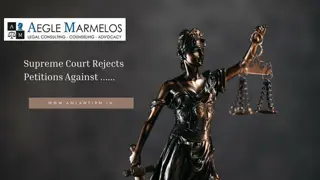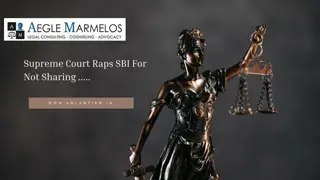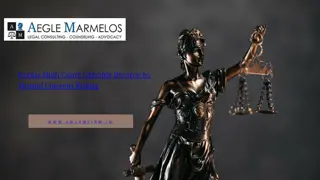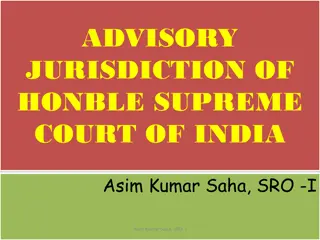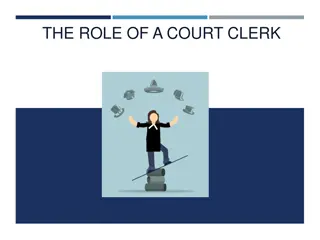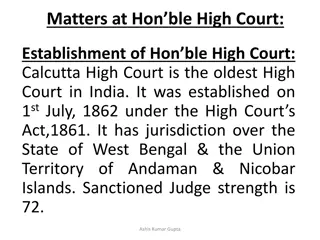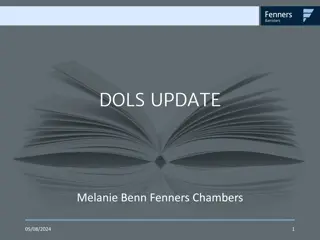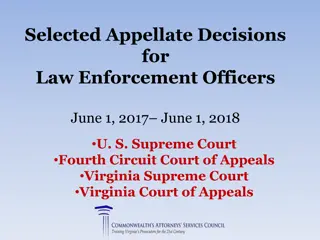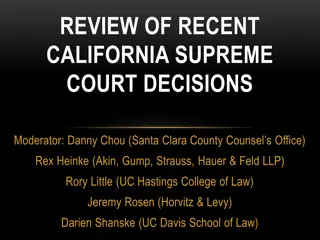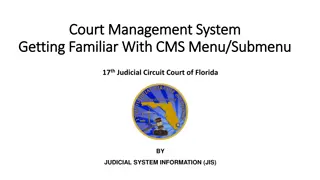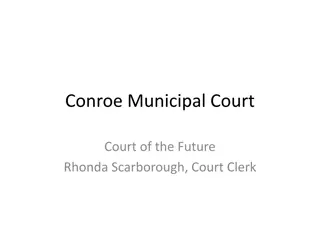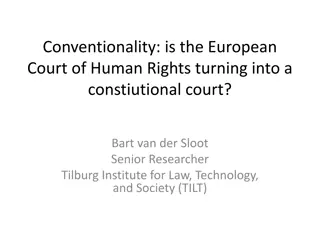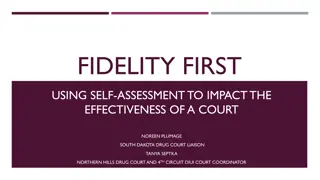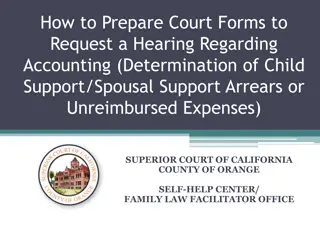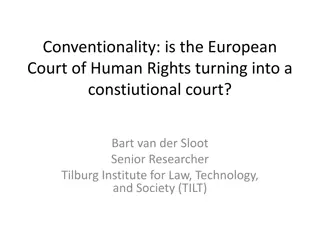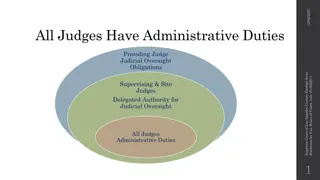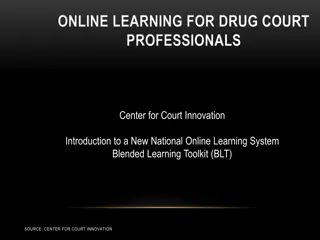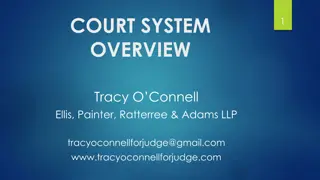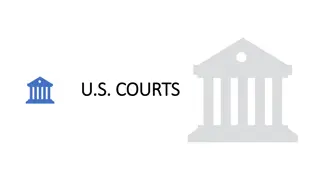Court Systems Impacting Children's Care in California
This webinar delves into various court systems affecting children's welfare in California, addressing challenges, and discussing the implementation of AB 260. Insights shared by experts provide valuable knowledge for youth, families, and advocates involved in navigating child custody matters.
Download Presentation

Please find below an Image/Link to download the presentation.
The content on the website is provided AS IS for your information and personal use only. It may not be sold, licensed, or shared on other websites without obtaining consent from the author.If you encounter any issues during the download, it is possible that the publisher has removed the file from their server.
You are allowed to download the files provided on this website for personal or commercial use, subject to the condition that they are used lawfully. All files are the property of their respective owners.
The content on the website is provided AS IS for your information and personal use only. It may not be sold, licensed, or shared on other websites without obtaining consent from the author.
E N D
Presentation Transcript
Logistics Webinar resources, including recording and supplemental materials, will be posted at https://allianceforchildrensrights.org/resources/ All attendees are muted during webinar. Please submit questions using the Questions function on your GotoWebinar dashboard. Email Erica Hickey at ehickey@alliancecr.org if you experience technical difficulties.
Agenda Overview of court systems that affect the care and custody of children in California Challenges that arise in navigating different court systems and agencies AB 260: What is it? How do we implement it? Case studies and practice tips for youth, families, and advocates
Juan Guzman, Director of Childrens Court Advocacy, Alliance for Children s Rights Sydney Steinkohl, Guardianship Program Director, Alliance for Children s Rights Sarah Saria, Attorney, Center for Families, Children & the Courts, Judicial Council of California Presenters
COURT SYSTEMS Understanding the courts supporting children at risk of abuse or neglect
CHILDRENS COURTS Juvenile Dependency Court: Juvenile Dependency Court is the branch of the Superior Court which hears cases involving neglected and/or abused children. Probate Court: Probate Court establishes probate guardianships set up because a child is living with an adult who is not the child s parent, and the adult needs a court order to make decisions on behalf of the child. Generally, probate guardianships are for children under 18. Probate Family Court: Family Court assists families with the litigation of domestic disputes (including divorce and separation), including the health, safety, and welfare of children. Juvenile Dependency Family
JUVENILE DEPENDENCY COURT Children Parents Caregivers Focus on family reunification if possible, including visitation Appointed counsel Assigned caseworker Focus on family reunification if possible, including visitation Appointed counsel Assigned caseworker Services may be provided to help remedy the child safety issues that exist in the home May retain some decisionmaking rights subject to court order No appointed counsel Eligible to receive: Emergency funding at time of placement, and foster care benefits once approved Specialized care support if needed Funding to transport child to their school Emergency childcare bridge Training
Entering the Child Welfare System Hotline call/report of child abuse or neglect Allegation unfounded, inconclusive, or unsubstantiated by DCFS Family agrees to services: Voluntary Family Maintenance or Voluntary Placement Agreement Submit application, WIC 329 and 331 Investigation by DCFS and determination of risk Referral by probate court, PC 1513(b) Juvenile Court hearings: if petition is sustained, then court orders placement and services for child Petition filed child removed from home and placed with relative or in foster care (or parents' home under court supervision)
PROBATE COURT Parents Caregivers Children Receive Notice of Petition for Guardianship (parents must be told that someone is attempting to get guardianship) Right to be represented by an attorney but not automatically appointed Generally the petitioner in a probate case Relative caregivers can receive CalWORKS Non-relative caregivers granted guardianship can receive AFDC-FC benefits Kinship navigation services may be available depending on county No due process rights: children are usually not parties in probate cases No automatic right to an attorney No right to be heard by the court No right to reunification services
FAMILY COURT Parents Caregivers Children No due process rights: children are not parties in family court matters No automatic right to an attorney No right to be heard by the court No right to reunification services Non-parent and relative caregivers may be granted custodial rights (physical custody) Services and financial assistance are limited, but can petition for child support or qualify for CalWORKS Judicial review and orders on their domestic disputes, including child custody orders Opportunity to be represented by an attorney, but one is not automatically appointed Court mandated family counseling Opportunity to advocate for their child s best interests
Navigating the Courts and Challenges for Families
LACK OF INFORMATION Many families were unable to identify whether the child in their home was there as a result of a formal foster care placement or an informal arrangement Lack of information provided to families about implications of different court systems or the benefits and services available to support children 24% of caregivers stated they were an informal kinship arrangement but also that they received foster care funding 42% of families stated they received no information about different types of legal arrangements 24% of caregivers stated they had guardianship through Probate Court but received foster care funding 40% of families had less than 24 hours notice before the children were placed in their home 18% of those that indicated they had guardianship through dependency court also said there was no child welfare involvement Hidden Foster Care: The Human Impact of Bypassing the Foster Care System
Hidden Foster Care Advised to seek probate legal guardianship Diversion from dependency Removal from parents Josh Gupta-Kagan, America s Hidden Foster Care System, 72 Stan. L. Rev. (April 2020)
FAMILIES STARTING AT PROBATE COURT HAVE FOUND IT DIFFICULT TO REVERSE COURSE Probate court is not required to refer cases involving child abuse or neglect to child welfare for investigation. (statutes changed after In re Christian G. which held that [t]he Probate Code is intended to work hand in hand with the dependency laws as a cohesive statutory structure that aims to subject all cases alleging parental unfitness to the rigors of a dependency investigation. ) Even if the probate court refers to child welfare for investigation, there has been no requirement or clear process for the juvenile court to review the decision of the social worker as to whether to file a petition in juvenile court. If the probate court takes action to protect the child (i.e. orders a temporary guardianship) and then refers the case to child welfare, the juvenile court was limited in its ability to order a petition to be filed due to Court of Appeal decision In re Kaylee H.
CONSTITUTIONAL RIGHT TO FAMILY INTEGRITY AND THE RIGHT TO COUNSEL No"State shall deprive any person of life, liberty or property, without due process of law." U.S. Constitution, Amendment XIV, Section 1. Due Process Clause of the Fourteenth Amendment protects parents' rights to the "care, custody and control of their children." Troxel v. Granville,530 U.S. 57, 65 (2000). If a governmental child welfare agency seeks to place the child in state custody through the dependency court system, the parent is entitled to procedural protections including the right to an attorney. (Welf. & Inst. Code, 317, subd. (c).)
Probate Court Dependency Court Funding for Caregiver? Limited funding available- for most families, only CalWORKs Full foster care funding, emergency childcare bridge funding and training, access to specialized care, clothing allowance, infant supplements, etc. Length of reunification services determined by the court; can include up to 15 months of post- reunification services AAP, Kin-GAP, or continued foster care funding for kin families if not reunified Eligible to receive Extended Foster Care, independent living skill services, or Education and Training vouchers depending on age in care Right to attend school of origin, including funding for transportation Duration of services? None Permanency funding? Not eligible to receive Kin-GAP or reunification funding Not eligible to receive extended foster care, independent living services, or Education or Training vouchers No funding or education rights Supports for TAY? Education rights? COMPARING FUNDING AND SUPPORTS
Assembly Bill 260 (Chapter 578, Statutes of 2021)
Chaptered in 2021 and went into effect January 1, 2022. AB 260 Basics Amends several sections of code: Welfare and Institutions Code 329 and 331 Government Code 68511.1 Probate Code 1511 and 1513
Purpose It is the intent of the legislature that the guardianship laws in this code and the juvenile court laws in the [WIC] operate together as a cohesive statutory structure that ensures all cases referred by the probate court for child welfare investigation are subject to review by the juvenile court without limiting the probate court's ability to take immediate action to protect the child while the child welfare investigation and juvenile court review are pending. The purpose of this statutory structure is to ensure the protection of every child's health, safety and welfare and to provide due process to every child, parent and family. Probate Code 1513(I)
Changes Under Assembly Bill 260 1. Requires the development of a Judicial Council form explaining the rights, duties, and obligations of the person serving as the guardian of a minor, and information about the services and supports available to a probate guardian and how they differ from the services and supports available to caregivers in the child welfare system, for use by the superior court and petitioners. 2. If the child in a probate guardianship case is or may be described by WIC 300, the probate court may refer the matter to the local child welfare agency to investigate. The agency shall report its findings within three weeks. If the child welfare agency has not filed a petition within three weeks, the probate court or minor s counsel request the juvenile dependency court s review of the agency s decision. 3. The probate court may take reasonable steps to protect the child s safety (e.g. temporary guardianship) pending a referral to the child welfare agency or dependency court but may not otherwise hear or determine the guardianship petition.
Gov. Code 68511.1: Updating Forms for Prospective Guardians and Caregivers The Judicial Council shall develop a form explaining the nature of a guardianship of a minor, the rights, duties, and obligations of a person serving as guardian of a minor, and information about the services and supports available to a probate guardian and how they differ from the services and supports available to a caregiver in the child welfare system or a guardian appointed by the juvenile court. The form shall be prepared in English and Spanish in language easily understood by a lay person not trained in law and shall be distributed to the superior courts in the state for use in guardianships established pursuant to Section 1514 of the Probate Code and Sections 360 and 366.26 of the Welfare and Institutions Code and for any other purposes as may be directed or permitted by the Judicial Council.
Form GC-207-INFO/JV-352- INFO Compares different voluntary and court-ordered caregiving arrangements across various topics: rights and duties, available financial supports and services, and appointment/approval processes. Designed to inform both prospective guardians and parents and must be included in the notice given pursuant to Probate Code 1511(a). Cross-references three additional forms: GC-205-INFO, GC 206-INFO, and JV-350-INFO Link to form: https://selfhelp.courts.ca.gov/jcc-form/GC- 207-INFO
Other New and Updated Informational Forms GC-205-INFO (Information on Probate Guardianship of the Person): https://selfhelp.courts.ca.gov/jcc-form/GC-205-INFO GC-206-INFO (Information on Probate Guardianship of the Estate): https://selfhelp.courts.ca.gov/jcc-form/GC-206-INFO JV-350-INFO (Information on Juvenile Court Guardianship): https://selfhelp.courts.ca.gov/jcc-form/JV-350-INFO
Changes to Guardianship ProceedingsReferral to Child Welfare Agency "If the proposed ward is or may be described by Section 300 of the Welfare and Institutions Code, the court may refer the matter in writing, to the local child welfare agency to initiate an investigation pursuant to Section 329 of the Welfare and Institutions Code." Probate Code 1513(b) The referral must include a summary of the reasons and may include the guardianship petition and other material information. The child welfare agency must follow the timelines in WIC 329. The court shall not make orders on the petition to appoint a guardian until the CW investigation has been completed and submitted to the probate court. "...pending completion of the child welfare investigation, the probate court may take any reasonable steps it deems appropriate to protect the child's safety, including but not limited to appointing a temporary guardian or issuing a temporary restraining order." Probate Code 1513(b)(3)
Form JV-210: Application to Commence Juvenile Court Proceedings https://selfhelp.courts.ca.gov/jcc-form/JV-210 https://selfhelp.courts.ca.gov/jcc-form/JV-210 Revised for a probate court s use: https://selfhelp.courts.ca.gov/jcc- form/JV-210 Last section is left blank for social worker to respond to the application following an investigation.
If the child welfare agency has not, within 3 weeks of the referral, notified the probate court that it has commenced juvenile court proceedings, the probate court, or counsel appointed pursuant to Section 1470 to represent the minor may apply to the juvenile court, pursuant to WIC 331 for an order directing the agency to commence juvenile dependency proceedings. Probate Code 1513(b)(4) If the juvenile court commences dependency proceedings, the guardianship proceedings are stayed pursuant to WIC 304. If the juvenile court does not commence dependency proceedings, the probate court retains jurisdiction to hear and determine the guardianship petition. Changes to Guardianship Proceedings Referral to Juvenile Court
WIC 331 Following an application under WIC 329, if the social worker has not filed a juvenile dependency petition within three weeks, the applicant may, within one month after making the application, apply to the juvenile court to review the social worker s decision not to file a petition. The juvenile court may: Make a finding that the child is, prima facie, described by Section 300, and order the social worker to commence juvenile court proceedings. Affirm the decision of the social worker, or Within five days of completing its review, the juvenile court shall transmit its decision in writing to the probate court.
Form JV-213: Probate Court Request for Juvenile Court Review of Decision Not to Commence Proceedings) Separate form for probate court requests for juvenile court review: https://selfhelp.courts.ca.gov/jc c-form/JV-213 The juvenile court may set the matter for hearing.
Temporary Guardianship Not a Bar to Commencing Dependency To address the opinion in Kaylee H., WIC 331(b)(1) clarifies that the juvenile dependency court can order the social worker to file a dependency petition even if the probate court previously ordered a temporary guardianship to maintain the child s safety pending further proceedings.
WAIT! Aren t we just funneling more kids into the dependency system, which we know to have life-changing trauma impacts on families, especially and disproportionately Black, Native American, and Latino families?
This is a question of tremendous concern In California, Black children are nearly three times as likely to be referredfor maltreatment; more than four times as likely to have a maltreatment allegation substantiated; and four times as likely to enter foster care as their white peers. Native American children are more than twice as likely to be referredfor maltreatment; two-and-a-half times as likely to have a maltreatment allegation substantiated; and more than three times as likely to enter foster care as their white peers.
Some Key Principles Both formal foster care and hidden foster care feature state surveillance and control of families of color, particularly Black families. This goes back as far as the patterns of family separation endemic to the slave trade. Repairing the forced separation, involuntariness, and coercion that families have and continue to experience require reforms that ensure that families have information, agency, and choice. Families shouldn t have to fail up into a formal foster care system in order to get the supports and services that they need. Investments in family and community continue to be key.
Case Study #1 Maternal Grandmother Clarissa receives a call from Child Protective Services (CPS) social worker notifying her that her adult daughter Mary, gave birth to baby Ana, but was prenatally drug exposed to methamphetamine. Due to Mary and Ana testing positive for methamphetamine, the CPS social worker reports that they will not release the baby to Mary, and since the father s identity is unknown, she will be placed in foster care unless a relative assumes care. When Ana was ready for discharge, the CPS social worker met Clarissa at the hospital. Mary begged not to be separated from Ana and said she is willing to enroll in any services, but the CPS social worker said no and allowed Clarissa to take Ana home. A week later, the CPS social worker stopped by Clarissa s home to check on Ana. Clarissa lives alone in a 2-bedroom apartment and Ana sleeps in her own bedroom. Clarissa has never been arrested, charged, or convicted of any crimes and has never had any prior involvement with CPS. The CPS social worker says the home is fine, but to close their investigation, Clarissa needs to obtain probate guardianship as quickly as possible. Afraid Ana will be removed from her home, Clarissa files a request for temporary and general probate legal guardianship.
Case Study #1 Discussion How would you advise Clarissa? How would you advise Ana? What Judicial Council forms would be helpful for the family in this scenario? What are the applicable procedures if the family wants to continue with the probate guardianship? If the family wants formal foster care?
Case Study #2 Teddy, age 6, called his uncle Karl crying because his parents Nico and Sara were yelling and physically fighting each other. Karl called law enforcement and rushed over to Nico and Sara s home. When Karl arrived, law enforcement was already there with a CPS social worker. The CPS social worker informed Karl that Teddy would not be released to either parent due to safety concerns. Karl said he was willing to take Teddy home with him and care for him for as long as necessary and the parents agreed. The CPS social worker drafted a Safety Plan that instructed Karl to obtain probate legal guardianship over Teddy, and it was signed by Nico, Sara, and Karl. Three days later the CPS social worker arrived at Karl s home to check up on Teddy. Karl lives in a studio apartment with his 6-year-old daughter Camila. Karl and Camila share a Queen size bed and Teddy sleeps on the sofa. Karl is currently working with Section 8 housing to find a larger living space. In 2003, Karl was convicted of welfare fraud, but has no other charges or convictions. The CPS social worker reports that they have an open abuse/neglect referral for Teddy, and are considering opening a foster care case, but warn they will not be able to place Teddy with Karl due to Karl s criminal past. However, CPS states they will close their referral if Karl obtains guardianship through probate court. Afraid he will lose Teddy to the foster care system, Karl files a request for temporary and general probate legal guardianship. Nico appears at the hearing and objects to the petition.
Case Study #2 Discussion How would you advise Karl? How would you advise Nico? What Judicial Council forms would be helpful for the family in this scenario? What if Teddy was 12 years old (instead of 6)? How would you advise Teddy?
Resources CDSS All-County Letter 22-47: https://www.cdss.ca.gov/Portals/9/Additional- Resources/Letters-and-Notices/ACLs/2022/22-47.pdf?ver=2022-08-19-102526- 420 ACR Hidden Foster Care Report: https://allianceforchildrensrights.org/resources/hiddenfostercare/



